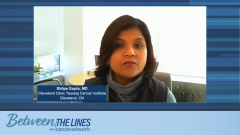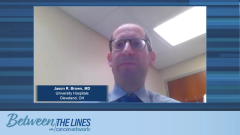
Next Steps in Adoption of Maintenance Therapy with Immune Checkpoint Inhibitors
Drs. Gupta and Brown share their thoughts on the next steps that can aid in uptake of maintenance therapy in different tumor types.
Episodes in this series

Jason R. Brown, MD: The final question is, what are some important next steps in terms of using maintenance immune checkpoint inhibition and adapting it into the mainstream in terms of treatment? Now, I think really the big thing is designing intelligent clinical trials to answer this question. I think we really need to kind of get a better understanding on what’s the importance of the treatment that patients received before and also the biology of the tumor since what we’ve seen is variation between, for example, bladder and lung cancer for first-line immune checkpoint inhibition.
Shilpa Gupta, MD: Yeah, and I’ll add to that, Jason, that especially from the urothelial cancer data for JAVELIN Bladder 100, we are seeing overall survival benefit but not everybody benefits, right? There are patients who have like lymph node and the metastases where the hazard ratio is not that good. The question arises should we intensify the maintenance regimen further to identify those patients who may benefit from something more than immunotherapy. And we are actually answering this question with combining avelumab with cabozantinib in a phase III trial through Cooperative Group, similar setting as maintenance but just intensification was the standard of care avelumab. I think once we come to a point where once patients achieve initial good response or stable disease and we can maintain it with intense approaches for a finite duration of time, that would be really the next step to add to other possibilities.
Jason R. Brown, MD: Yeah, absolutely. With the intensification, it’s important knowing what patients we can intensify for which might bring forward biomarkers as well, as we discussed earlier, but also just appropriately choosing the right patients for these intensifications. Because some patients will benefit without it, but some patients will absolutely need that. So that trial that we’re opening up with cabozantinib and avelumab will be extremely important in answering some of these questions that we’ve raised.
Thank you for this discussion today. We hope that you found this informative, and thank you, Shilpa, for including me in this conversation.
Shilpa Gupta, MD: Thank you, Jason. It was great having you and discussing the current evidence and future directions. I think maintenance therapy is here to stay, and we learn more and more from ongoing trials. Thank you to the audience for your attention.
Transcript edited for clarity.
Newsletter
Stay up to date on recent advances in the multidisciplinary approach to cancer.




































